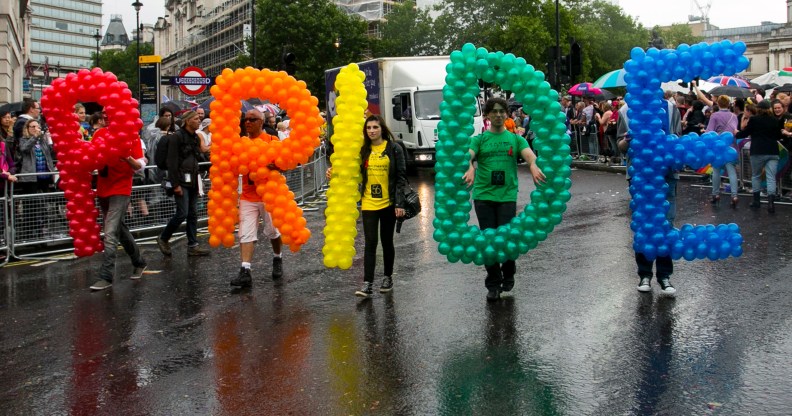Middlesbrough Council votes to change LGBT acronym

People take part in the LGBT parade during the annual Pride In London parade on June 28, 2014 in London, England. (John Phillips/Getty)
A council in England has voted to change the LGBT acronym, adding a distinction between sexual orientation and gender identity.
The Middlesbrough Council’s Adult Social Care and Services Scrutiny Panel will now longer be using the LGBT acronym to signify “lesbian, gay, bisexual, transgender” but LGB&T.
A committee produced a report to consider possible changes to the LGBT acronym, according to local news outlet Teesside Live.
“The acronym initially utilised by the panel was LGBT, which is arguably the most generic and commonly use,” the report read.
“Following information received at the 5 September 2018 meeting, and in reflection of some of the previous research (e.g. Government Equalities Office, 2018), the panel opted to replace use of the LGBT acronym with LGB&T (Lesbian, Gay, Bisexual and Transgender),” it concluded.
Alternatives to the LGBT acronym
The report added that the committee considered other acronyms, such as LGBTQ+, wherein the Q can stand for either ‘questioning’ or ‘queer’ and the plus sign is added to signify inclusivity.
Another acronym considered was LGBTQQIP2SAA, which includes the two possible meanings of Q, as well as I for intersex, P for pansexual, 2S for two spirit—a term used by Indigenous North American and First Nations people to represent those who possess both masculine and feminine spirits—and double A for asexual and androgynous.
“My greatest piece of advice to both the LGB and the T is to actually work together and support one another.”
— Anjeli Patel
The council is committed to introduce the change effective immediately, with a meeting scheduled on Monday (December 3) set to discuss “the Lesbian, Gay, Bisexual and Transgender (LGB&T) Community and Elderly Care.”
Local transgender charity Trans Aware welcomed the decision, with founder and director Ellie Lowther telling BBC the change represented a “massive stride forward.”
“I think there’s a discussion to be had and I think it’s currently not being had,” Lowther added.

But the change is likely to be controversial. Following the anti-trans protest by a lesbian group during Pride in London in July, which parade organisers condemned as “vile,” members of the LGBT+ community think it is important to highlight unity rather than differences.
“The two things go hand in hand in the sense—without supporting one another, we are already a marginalised group. Let’s not marginalise an already marginalised group. Let’s stick together and let’s support one another,” said Anjeli Patel, a senior consultant with EY’s people advisory practice, in a recent video filmed by LGBT+ charity Stonewall.
In the video, Patel added: “My greatest piece of advice to both the LGB and the T is to actually work together and support one another because we really do rely on each other in so many ways.”
How did this story make you feel?

